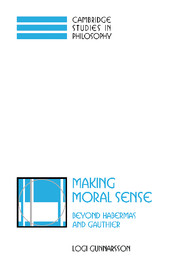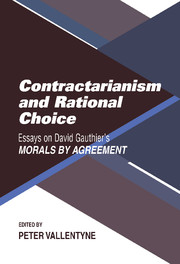Making Moral Sense
Is it rational to be moral? Can moral disputes be settled rationally? Which criteria determine what we have a good reason to do? In this innovative book, Logi Gunnarsson takes issue with the assumption made by many philosophers faced with the problem of reconciling moral norms with a scientific world view, namely that morality must be offered a non-moral justification based on a formal concept of rationality. He argues that the criteria for the rationality of an action are irreducibly substantive, rather than purely formal, and that assuming that morality must be given a non-moral justification amounts to a distortion of both rationality and morality. His discussion includes substantial critical engagement with major thinkers from two very different philosophical traditions, and is notable for its clear and succinct account of Habermas' discourse ethics. It will appeal to anyone interested in practical reason and the rational credentials of morality.
- Advances an innovative theory of rationality
- Engages with both analytical and Continental philosophers
- Offers a very clear and succinct account of Habermas' discourse ethics
Product details
September 2000Hardback
9780521780230
300 pages
216 × 140 × 21 mm
0.53kg
3 tables
Available
Table of Contents
- Preface
- Part I. Problems:
- 1. The justificatory crisis of morality
- 2. Alternative resolutions of the justificatory crisis
- 3. Subjective reasons
- 4. Substantive reasons
- 5. Overcoming rationalism
- Part II. Against Rationalism:
- 6. Gauthier's contractarianism
- 7. From here to pre-social agreement
- 8. Habermas' discourse ethics
- 9. Discoursing about discourse
- Part III. For the Substantive Approach:
- 10. Self-understanding and self-assessment
- 11. The possibility of progress
- 12. Practical arguments vs. impossibility arguments
- 13. Evaluation of others
- 14. Universality without neutrality
- Part IV. For Particularist Substantivism:
- 15. Against formalism
- 16. Particularist substantivism vs. list-substantivism
- Appendix: transcendental vs. universal pragmatics
- Bibliography
- Index.







